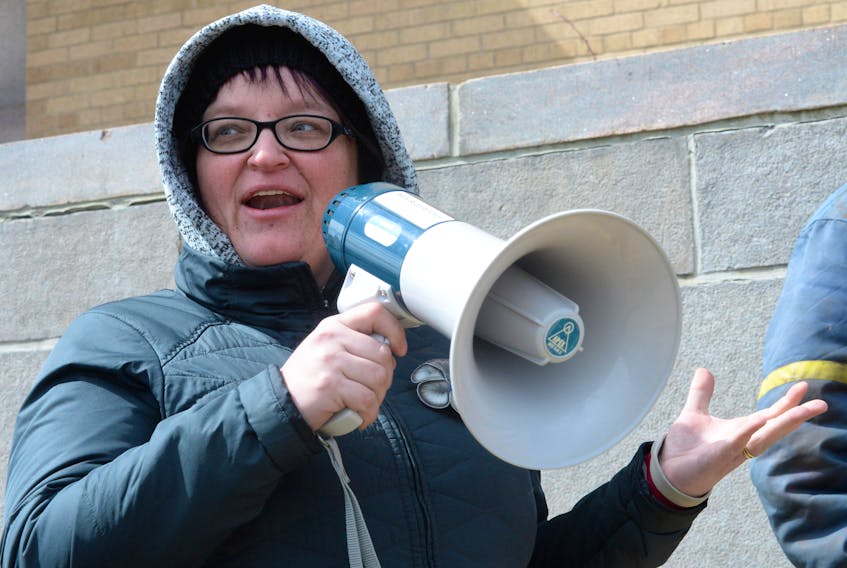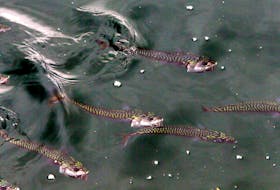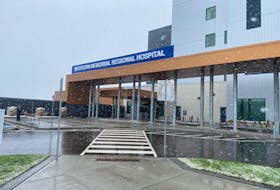A 17 per cent overall cut in the total allowable catch (TAC) for snow crab in Newfoundland and Labrador this year sparked a protest by FISH-NL and its supporters Friday afternoon on a cold and windy Confederation Hill in St. John’s.
FISH-NL president Ryan Cleary told those gathered that the inshore fishery in the province is getting hit with bad news after bad news, and no one is fighting for the fish harvesters and the survival of rural Newfoundland and Labrador.
Cleary said the protest was about sending a message to the provincial and federal governments that the inshore harvesters and rural communities in Newfoundland and Labrador deserve better.
He said some fish harvesters who were expecting a 10 per cent cut in their snow crab quota this year received a 50 per cent decrease.
“I’ve got calls this morning from people who did not want to get up, they had nothing to get up for,” Cleary said. “The inshore fishery, the lifeblood of Newfoundland and Labrador, is in a mess.”
The Department of Fisheries and Oceans (DFO) this week set the 2018 TAC for snow crab in the Newfoundland and Labrador region at 28,975 tonnes — a decrease of about 17 per cent from 2017. The snow crab fishery will open Monday for many areas, and later this month in other areas.
The TAC reduction is a particularly hard blow to the west and southwest coasts of the province (divisions 4R and 3Pn), which will see a 50 per cent reduction to quota. There will be a 24 per cent decrease in Division 3LNO off the east coast and southeast coast (30 per cent in the areas outside the 200-mile limit, and 24 per cent in areas inside the 200 mile limit).
Meanwhile, there is good news for some areas of the province, such as division 3Ps along the province’s south coast, where the quota will increase by 19 per cent, and in 3K off the northeast coast, where there will be a two per cent increase in quota.
Many fish harvesters are devastated by the cuts.
It’s a second blow this week after the province’s Fish Price Setting Panel set the price of snow crab per pound this year at $4.55, which is in line with the proposal set forth by the Association of Seafood Producers.
Cleary said the price stings local fish harvesters because in Nova Scotia snow crab will fetch $6 per pound, and in Quebec it will get $7.25 per pound. Outside buyers are not permitted to come into Newfoundland and Labrador.
But Friday’s protest was about more than snow crab.
Cleary touched on a number of other issues, such as the lack of a rebuilding plan for northern cod, which has been under moratorium for 26 years; the lack of the federal government’s acknowledgment of the importance of adjacency — that those closest to a resource should be the primary beneficiaries of it; the difficulties encountered by young people who want to get into the fishery; the recent decision by federal Fisheries Minister Dominic LeBlanc to take 25 per cent of the Arctic surf clam quota and give it to a newly formed consortium of Indigenous groups.
Cleary said fish harvesters have to demand their union, provincial government and federal government representatives take a stand and demand better management and respect from DFO.
Fish harvester Tammy Elliott of Gambo said that with the snow crab management plan coming only days before the fishery opens, fish harvesters don’t have enough time to digest the information, make adjustments or question the management decisions.
She said neither DFO nor the Fish, Food and Allied Workers (FFAW-Unifor) listen to the concerns of fish harvesters.
“We want a say in the management plans,” Elliott said. “We want to be given a fair chance. I’d like for everyone here to challenge their union reps and their government members.”
Peter Leonard from Southern Harbour, a fisherman for 34 years, said that in the last eight to 10 years the fishery has been on a downward spiral. It’s worse, he said, than when the northern cod moratorium was announced in 1992.
“In 1992 we had a government here in Newfoundland and Labrador, and in Canada, and we had a union,” Leonard said. “Now we got nothing. No one cares about the northern cod, the green crab in Placentia Bay, the offshore trawlers in 3Ps. We are a dying breed and there’s no one who cares.
“If we don’t stand together to fight for ourselves, there will be no one left to fight.”
Independent MHA Paul Lane was the only MHA at the protest.
He said the fishery affects everyone in Newfoundland and Labrador, whether they live in an urban or rural area. He said all MHAs and the seven Newfoundland and Labrador members of Parliament need to fight for the survival of the province’s inshore fishery.
Scientific information on snow crab stocks off Newfoundland and Labrador this year has shown the stock remains at low levels going into this spring’s fishery, but indications are for growth in the coming years.
At a technical briefing some weeks ago, DFO Science officials stated that optimism for future years will only hold true if measures are taken to further protect an apparent increase in small and medium-sized crab being seen in most areas of the province.
The snow crab assessment showed that while the biomass remained relatively unchanged from last year, more favourable water temperatures for crab have resulted in better production in the last couple of years, which offers hope for future years.
DFO says the management approach with snow crab for 2018 includes the continuation of early and shortened fishing seasons, no fall fishery in 3K and continued implementation of the soft-shell protocol.
The FFAW-Unifor issued a news release Friday stating fish harvesters are fed up with the breakdown of fisheries management in Newfoundland and Labrador, and are expressing their frustration after the announcement of significant cuts to snow crab quotas.
“What we’re seeing is the erosion of shared stewardship of our fisheries,” said Nelson Bussey, an inshore harvester from Port de Grave. “Participation in consultations with DFO has become meaningless when all harvester knowledge and input is completely ignored.”
Robbie Green, an inshore harvester from Old Perlican, said fish harvester knowledge and experience is crucial to the management of fisheries.
“It feels like we’ve gone back 25 years to a time when no one listened to harvesters” Green said “There was a time when we felt DFO was actually taking our point of view to heart. That time is long gone.”









